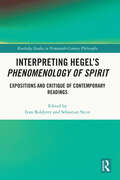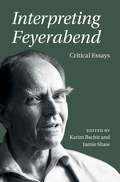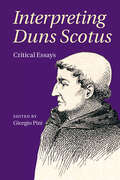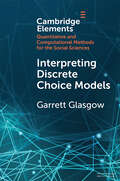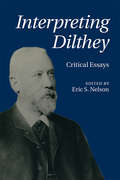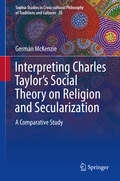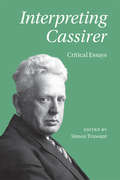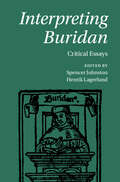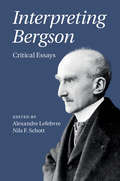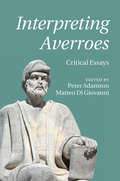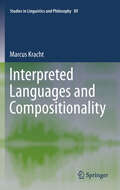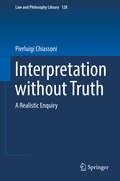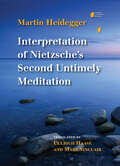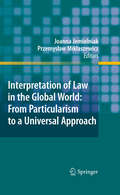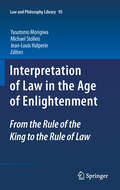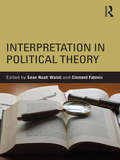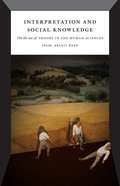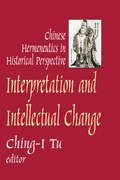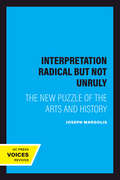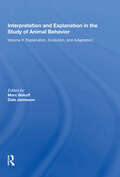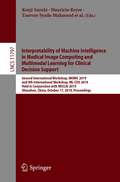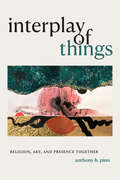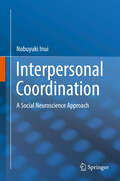- Table View
- List View
Interpreting Hegel’s Phenomenology of Spirit: Expositions and Critique of Contemporary Readings (Routledge Studies in Nineteenth-Century Philosophy)
by Ivan Boldyrev Sebastian SteinThis book focuses on the interpretations of Hegel’s Phenomenology of Spirit that have proved influential over the past decades. Current readers of Hegel’s Phenomenology face an abundance of interpretive literature devoted to this difficult text and confront a plethora of different philosophical presuppositions, research strategies and hermeneutic efforts.To enable a better orientation within the interpretative landscape, the essays in this volume summarize, contextualize and critically comment on the issues and currents in contemporary Phenomenology scholarship. There is a common set of three questions that each of the contributions seeks to answer: (1) What kind of text is The Phenomenology of Spirit? (2) What do the different strategies of interpretation conceptually bring to the text? (3) How do different interpreters justify their verdict on whether the Phenomenology is still a viable project?
Interpreting Feyerabend: Critical Essays
by Jamie Shaw Karim BschirThis collection of new essays interprets and critically evaluates the philosophy of Paul Feyerabend. It offers innovative historical scholarship on Feyerabend's take on topics such as realism, empiricism, mimesis, voluntarism, pluralism, materialism, and the mind-body problem, as well as certain debates in the philosophy of physics. It also considers the ways in which Feyerabend's thought can contribute to contemporary debates in science and public policy, including questions about the nature of scientific methodology, the role of science in society, citizen science, scientism, and the role of expertise in public policy. The volume will provide readers with a comprehensive overview of the topics which Feyerabend engaged with throughout his career, showing both the breadth and the depth of his thought.
Interpreting Duns Scotus: Critical Essays
by Giorgio PiniJohn Duns Scotus is commonly recognized as one of the most original thinkers of medieval philosophy. His influence on subsequent philosophers and theologians is enormous and extends well beyond the limits of the Middle Ages. His thought, however, might be intimidating for the non-initiated, because of the sheer number of topics he touched on and the difficulty of his style. The eleven essays collected here, especially written for this volume by some of the leading scholars in the field, take the reader through various topics, including Duns Scotus's intellectual environment, his argument for the existence of God, and his conceptions of modality, order, causality, freedom, and human nature. This volume provides a reliable point of entrance to the thought of Duns Scotus while giving a snapshot of some of the best research that is now being done on this difficult but intellectually rewarding thinker.
Interpreting Discrete Choice Models (Elements in Quantitative and Computational Methods for the Social Sciences)
by Garrett GlasgowIn discrete choice models the relationships between the independent variables and the choice probabilities are nonlinear, depending on both the value of the particular independent variable being interpreted and the values of the other independent variables. Thus, interpreting the magnitude of the effects (the “substantive effects”) of the independent variables on choice behavior requires the use of additional interpretative techniques. Three common techniques for interpretation are described here: first differences, marginal effects and elasticities, and odds ratios. Concepts related to these techniques are also discussed, as well as methods to account for estimation uncertainty. Interpretation of binary logits, ordered logits, multinomial and conditional logits, and mixed discrete choice models such as mixed multinomial logits and random effects logits for panel data are covered in detail. The techniques discussed here are general, and can be applied to other models with discrete dependent variables which are not specifically described here.
Interpreting Dilthey: Critical Essays
by Eric S. NelsonIn this wide-ranging and authoritative volume, leading scholars engage with the philosophy and writings of Wilhelm Dilthey, a key figure in nineteenth-century thought. Their chapters cover his innovative philosophical strategies and explore how they can be understood in relation to their historical situation, as well as presenting incisive interpretations of Dilthey's arguments, including their development, their content, and their influence on later thought. A key focus is on how Dilthey's work remains relevant to current debates around art and literature, the biographical and autobiographical self, knowledge, language, science, culture, history, society, and psychology and the embodied mind. The volume will be important for researchers in hermeneutics, aesthetics, practical philosophy, and the history of German philosophy, providing a valuable introduction to Dilthey's work as well as detailed critical analysis of its ongoing significance.
Interpreting Charles Taylor’s Social Theory on Religion and Secularization
by Germán MckenzieThis book examines "Taylorean social theory," its sources, main characteristics and impact. Charles Taylor's meta-narrative of secularization in the West, prominently contained in his major work A Secular Age (2007), has brought new insight on the social and cultural factors that intervened in such process, the role of human agency, and particularly on the contemporary conditions of belief in North America and Europe. This study discusses what Taylor's approach has brought to the scholarly debate on Western secularization, which has been carried on mostly in sociological terms. McKenzie interprets Taylor's views in a way that offers an original social theory. Such interpretation is possible with the help of sociologist Margaret Archer's "morphogenetic theory" and by making the most of Taylor's particular understanding of the method of the social sciences and of his philosophical views on human beings, knowledge and modernity. After exploring the philosophical and sociological sources informing Taylorean social theory and proposing its basic concepts and hermeneutic guidelines, the author compares it with two widespread theories of secularization: the now waning "orthodox" account and that proposed by Rational Choice Theory scholars, particularly prevalent in the United States. In doing so, the book shows in which ways Taylorean social theory supersedes them, what new issues it brings into the scholarly discussion, and what difficulties might limit its future development.
Interpreting Cassirer: Critical Essays
by Simon TruwantThis is the first comprehensive volume in English on Cassirer's philosophy for over seventy years. Eleven leading Cassirer scholars address all of the key aspects of Cassirer's multi-faceted thought and situate them in the wider context of his philosophy of culture. Their essays demonstrate the depth and richness of a philosophical enterprise that still awaits recognition as one of the most original contributions to twentieth-century philosophy. Interpreting Cassirer will prove invaluable not only for Cassirer scholars and researchers of early twentieth-century philosophy, but also for scholars of the philosophy of culture, language, science, art, history, and mind.
Interpreting Buridan: Critical Essays
by Henrik Lagerlund Spencer JohnstonJohn Buridan (d. 1362) is one of the great thinkers of the later Middle Ages. He is perhaps best known for his contributions to logic, but the range of his thought is wide. This volume of new essays, written by leading Buridan scholars, places Buridan in his philosophical context and examines his writings on logic, modal logic, paradoxes, metaphysics, epistemology, and natural philosophy. It also introduces several new topics of discussion that have not so far been dealt with in scholarship on Buridan, such as his theory of knowledge, his view of artefacts, his conception of women, his writing on emotions, and his moral philosophy. Together the essays produce a rich picture of Buridan's thought and underline the continuing relevance of his philosophical concerns.
Interpreting Bergson: Critical Essays
by Alexandre Lefebvre Nils F. SchottBergson was a pre-eminent European philosopher of the early twentieth century and his work covers all major branches of philosophy. This volume of essays is the first collection in twenty years in English to address the whole of Bergson's philosophy, including his metaphysics, epistemology, philosophy of science, philosophy of life, aesthetics, ethics, social and political thought, and religion. The essays explore Bergson's influence on a number of different fields, and also extend his thought to pressing issues of our time, including philosophy as a way of life, inclusion and exclusion in politics, ecology, the philosophy of race and discrimination, and religion and its enduring appeal. The volume will be valuable for all who are interested in this important thinker and his continuing relevance.
Interpreting Avicenna
by Peter AdamsonAvicenna is the greatest philosopher of the Islamic world. His immense impact on Christian and Jewish medieval thought, as well as on the subsequent Islamic tradition, is charted in this volume alongside studies which provide a comprehensive introduction to and analysis of his philosophy. Contributions from leading scholars address a wide range of topics including Avicenna's life and works, conception of philosophy and achievement in logic and medicine. His ideas in the main areas of philosophy, such as epistemology, philosophy of religion and physics, are also analyzed. While serving as a general introduction to Avicenna's thought, this collection of critical essays also represents the cutting edge of scholarship on this most influential philosopher of the medieval era.
Interpreting Averroes: Critical Essays
by Peter Adamson Matteo Di GiovanniThis volume brings together world-leading scholars on the thought of Averroes, the greatest medieval commentator on Aristotle but also a major scholar of Islam. The collection situates him in his historical context by emphasizing the way that he responded to the political situation of twelfth-century Islamic Spain and the provocations of Islamic theology. It also sheds light on the interconnections between aspects of his work that are usually studied separately, such as his treatises on logic and his legal writings. Advanced students and scholars will find authoritative and insightful treatments of Averroes' philosophy, tackled from multiple perspectives and written in a clear and accessible way that will appeal to those encountering his work for the first time as well as to anyone looking for new critical approaches to Averroes and his thinking.
Interpreted Languages and Compositionality
by Marcus KrachtThis book argues that languages are composed of sets of 'signs', rather than 'strings'. This notion, first posited by de Saussure in the early 20th century, has for decades been neglected by linguists, particularly following Chomsky's heavy critiques of the 1950s. Yet since the emergence of formal semantics in the 1970s, the issue of compositionality has gained traction in the theoretical debate, becoming a selling point for linguistic theories. Yet the concept of 'compositionality' itself remains ill-defined, an issue this book addresses. Positioning compositionality as a cornerstone in linguistic theory, it argues that, contrary to widely held beliefs, there exist non-compositional languages, which shows that the concept of compositionality has empirical content. The author asserts that the existence of syntactic structure can flow from the fact that a compositional grammar cannot be delivered without prior agreement on the syntactic structure of the constituents.
Interpretation without Truth: A Realistic Enquiry (Law and Philosophy Library #128)
by Pierluigi ChiassoniThis book engages in an analytical and realistic enquiry into legal interpretation and a selection of related matters including legal gaps, judicial fictions, judicial precedent, legal defeasibility, and legislation. Chapter 1 provides an outline of the central theoretical and methodological tenets of analytical realism. Chapter 2 presents a conceptual apparatus concerning the phenomenon of legal interpretation, which it subsequently applies to investigate the truth-in-legal-interpretation issue. Chapters 3 to 6 argue for a theory of legal interpretation - pragmatic realism - by outlining a theory of interpretive games, revisiting the debate between literalism and contextualism in contemporary philosophy of language, and underscoring the many shortcomings of the container-retrieval view and pragmatic formalism. In turn, Chapter 7, focusing on comparative legal theory, advocates an interpretation-sensitive theory of legal gaps, as opposed to purely normativist ones. Chapter 8 explores the connection between judicial reasoning and judicial fictions, casting light on the structure and purpose of fictional reasoning. Chapter 9 provides an analytical enquiry into judicial precedent, examining a variety of ideal-typical systems in terms of their normative or de iure relevance. Chapter 10 addresses defeasibility and legal indeterminacy. In closing, Chapter 11 highlights the central tenets of a realistic theory of legislation.
Interpretation of Nietzsche's Second Untimely Meditation (Studies in Continental Thought)
by Martin HeideggerA “readable and fluent” translation of a work that demonstrates a crucial shift in Heidegger’s approach to Nietzsche in the late 1930s (Phenomenological Reviews).In Nietzsche’s Second Untimely Meditation, Martin Heidegger offers a radically different reading of a text that he had read decades earlier. This evolution in his relationship with Nietzsche has a significant impact on his understandings of the differences between animals and humans, temporality and history, and the Western philosophical tradition developed.With his new reading, Heidegger delineates three Nietzschean modes of history, which should be understood as grounded in the structure of temporality or historicity. He also offers a metaphysical determination of life and the essence of humankind. Despite the fragmentary and disjointed quality of the original lecture notes that comprise this text, Ullrich Hasse and Mark Sinclair deliver a clear and accessible translation.
Interpretation of Law in the Global World: From Particularism to a Universal Approach
by Przemyslaw Miklaszewicz Joanna JemielniakThe volume examines the impact of applying transnational rules on the repertory, methods and practice of legal interpretation. It scrutinizes how globalization processes in law - those reaching top-down (such as European law), as well as those developing bottom-up (such as the new lex mercatoria and international commercial arbitration) - influence the often highly innovative use of various methods of legal rendition. It also examines to what extent they affect supranational and domestic decision-making. Capturing the current development of universalizing tendencies in legal interpretation, the book offers both an extensive theoretical background and thorough studies on adjudicatory practice in such fields as European and constitutional law, international business law and arbitration or criminal law.
Interpretation of Law in the Age of Enlightenment
by Michael Stolleis Yasutomo Morigiwa Jean-Louis HalperinA collaboration of leading historians of European law and philosophers of law and politics identifying and explaining the practice of interpretation of law in the 18th century. The goal: establishing the actual practice in the Age of Enlightenment, and explaining why this was the case. The ideology of the Age was that law, i.e., the will of the sovereign, can be explicitly and appropriately stated, thus making interpretation redundant. However, the reality was that in the 18th century, there was no one leading source of national law that would be the object of interpretation. Instead, there was a plurality of sources of law: the Roman Law, local customary law, and the royal ordinance. However, in deciding a case in a court of law, the law must speak with one voice. Hence, interpretation to unify the norms was inevitable. What was the process? What role did justification in terms of reason, the hallmark of the Enlightenment, play? These are some of the questions addressed.
Interpretation in Political Theory
by Clement Fatovic Sean Noah WalshTheorists interested in learning more about any given interpretive approach are often required to navigate a dizzying array of sources, with no clear sense of where to begin. The prose of many primary sources is often steeped in dense and technical argot that novices find intimidating or even impenetrable. Interpretation in Political Theory provide students of political theory a single introductory reference guide to major approaches to interpretation available in the field today. Comprehensive and clearly written, the book includes: A historical and theoretical overview that situates the practice of interpretation within the development of political theory in the twentieth century. Chapters on Straussian esotericism, historical approaches within the Cambridge School of interpretation, materialist approaches associated with Marxism, the critical approaches associated with varieties of feminism, Greimassian semiotics, Foucaultian genealogy, the negative dialectics of Theodor Adorno, deconstruction as exemplified by Jacques Derrida and Paul de Man, and Lacanian psychoanalysis. An exposition of the theoretical and disciplinary background of each approach, the tools and techniques of interpretation it uses, its assumptions about what counts as a relevant text in political theory, and what it considers to be the purpose or objective of reading in political theory. A reading of Thomas Hobbes’s Leviathan to illustrate how each approach can be applied in practice. A list of suggestions for further reading that will guide those interested in pursuing more advanced study. An invaluable textbook for advanced undergraduates, graduate students, and even seasoned scholars of political theory interested in learning more about different interpretive approaches.
Interpretation and Social Knowledge: On the Use of Theory in the Human Sciences
by Isaac Ariail ReedFor the past fifty years anxiety over naturalism has driven debates in social theory. One side sees social science as another kind of natural science, while the other rejects the possibility of objective and explanatory knowledge. Interpretation and Social Knowledge suggests a different route, offering a way forward for an antinaturalist sociology that overcomes the opposition between interpretation and explanation and uses theory to build concrete, historically specific causal explanations of social phenomena.
Interpretation and Social Knowledge: On the Use of Theory in the Human Sciences
by Isaac Ariail ReedFor the past fifty years anxiety over naturalism has driven debates in social theory. One side sees social science as another kind of natural science, while the other rejects the possibility of objective and explanatory knowledge. Interpretation and Social Knowledge suggests a different route, offering a way forward for an antinaturalist sociology that overcomes the opposition between interpretation and explanation and uses theory to build concrete, historically specific causal explanations of social phenomena.
Interpretation and Intellectual Change: Chinese Hermeneutics in Historical Perspective
by Ching-I Tu"This volume deals with the development of Chinese hermeneutics, or exegetic systems, from their beginnings to the twentieth century. The contributors address critical issues in the study of Chinese hermeneutics by focusing on key periods during which the hermeneutic tradition in China underwent significant changes.The volume is divided into six parts, corresponding to the six major periods of intellectual change in traditional and contemporary China. Part 1 considers the foundational period of Chinese hermeneutics, examining Confucian classics such as the Analects, Mencius, and the Book of Odes. Part 2 traces the broadening of the hermeneutic tradition from Confucian classics to the military canon, political discourse, astronomy, and Buddhist exegesis from the Han to the Chinese Middle Ages. In Part 3 the focus is on Zhu Xi's monumental synthesis and redefinition of the Confucian tradition at the beginning of the early modern period. His vision of Confucian thought remained influential throughout the imperial period, and his interpretations of the Confucian classics became state orthodoxy starting with the thirteenth century. Part 4 focuses on this challenge and discusses the intellectual changes that took place during the late imperial period and their profound effects on Chinese hermeneutics. Part 5 documents the challenges to traditional Chinese hermeneutics in the modern era and the emergence of a new, critical hermeneutics in the beginning of the twentieth century. The volume concludes with Part 6, which explores Chinese hermeneutics from a comparative perspective and identifies its distinctive features.The understanding of Chinese hermeneutics gained from these essays is that of a dynamic plurality of traditions that has endured into the twentieth century and continues to shape contemporary intellectual debates."
Interpretation Radical but Not Unruly: The New Puzzle of the Arts and History
by Joseph MargolisWith this challenging work, Joseph Margolis continues the project begun in The Flux of History and the Flux of Science (California, 1993). Tackling one of philosophy's master themes, he develops the controversial thesis that the world is a flux. Here he applies this doctrine to Western theories of history and the interpretation of cultural phenomena—offering the first sustained analysis of the logic, methodology, and metaphysics of interpretation committed to a thoroughgoing relativism and the historicized structure of cultural phenomena. Versed in Anglo-American and Continental philosophy, Margolis draws on the best views of Western philosophy to investigate a topic regularly ignored in that tradition. The result is the surprising synthesis of two historically antipathetic approaches to philosophy.
Interpretation And Explanation In The Study Of Animal Behavior: Volume I, Interpretation, Intentionality, And Communication
by Ph.D. BekoffPeople have long been fascinated, not just by the behaviour of non-human animals, but by the problem of how this behaviour is to be interpreted and explained. This is one of two volumes of original essays on the cognitive and emotional dimensions of non-human minds and the relationship of natural minds to behaviour. The essays also address questions concerning the meaning and significance of consciousness; animal intelligence, awareness and emotions; behavioural plasticity, flexibility and constraints on understanding animal minds; and the structure of explanation in the study of behaviour.
Interpretability of Machine Intelligence in Medical Image Computing and Multimodal Learning for Clinical Decision Support: Second International Workshop, iMIMIC 2019, and 9th International Workshop, ML-CDS 2019, Held in Conjunction with MICCAI 2019, Shenzhen, China, October 17, 2019, Proceedings (Lecture Notes in Computer Science #11797)
by Ben Glocker Kenji Suzuki Mauricio Reyes Tanveer Syeda-Mahmood Hayit Greenspan Anant Madabhushi Roland Wiest Eth Zurich Yaniv GurThis book constitutes the refereed joint proceedings of the Second International Workshop on Interpretability of Machine Intelligence in Medical Image Computing, iMIMIC 2019, and the 9th International Workshop on Multimodal Learning for Clinical Decision Support, ML-CDS 2019, held in conjunction with the 22nd International Conference on Medical Imaging and Computer-Assisted Intervention, MICCAI 2019, in Shenzhen, China, in October 2019. The 7 full papers presented at iMIMIC 2019 and the 3 full papers presented at ML-CDS 2019 were carefully reviewed and selected from 10 submissions to iMIMIC and numerous submissions to ML-CDS. The iMIMIC papers focus on introducing the challenges and opportunities related to the topic of interpretability of machine learning systems in the context of medical imaging and computer assisted intervention. The ML-CDS papers discuss machine learning on multimodal data sets for clinical decision support and treatment planning.
Interplay of Things: Religion, Art, and Presence Together
by Anthony B. PinnIn Interplay of Things Anthony B. Pinn theorizes religion as a technology for interrogating human experiences and the boundaries between people and other things. Rather than considering religion in terms of institutions, doctrines, and creeds, Pinn shows how religion exposes the openness and porousness of all things and how they are always involved in processes of exchange and interplay. Pinn examines work by Nella Larsen and Richard Wright that illustrates an openness between things, and he traces how pop art and readymades point to the multidirectional nature of influence. He also shows how Ron Athey's and Clifford Owens's performance art draws out inherent interconnectedness to various cultural codes in ways that reveal the symbiotic relationship between art and religion as a technology. Theorizing that antiblack racism and gender- and class-based hostility constitute efforts to close off the porous nature of certain bodies, Pinn shows how many artists have rebelled against these attempts to counter openness. His analyses offer a means by which to understand the porous, unbounded, and open nature of humans and things.
Interpersonal Coordination: A Social Neuroscience Approach
by Nobuyuki InuiThis book explores the fascinating area of interpersonal coordination in force production tasks, outlining the author’s extensive research to date and presenting stimulating new perspectives. The purpose is to provide a detailed exposition of current understanding of the science behind interpersonal joint action. Readers will find clear explanation of concepts from social cognition and neuroscience that are key to an understanding of the field, including the social brain hypothesis, the mirror neuron system, and joint action, as well as other relevant background information. The author then proceeds to present an overview of recent original studies on interpersonal movement coordination performed at his laboratory in Japan. These studies provide insights into such issues as complementary and synchronous force production in joint action, bidirectional transfer between joint and solo actions, and motor control hierarchy in joint action involving bimanual force. They also set the direction for integration of knowledge of physical properties and social cognition. The book will be of interest for researchers and graduate students in all areas of the biomedical sciences.
